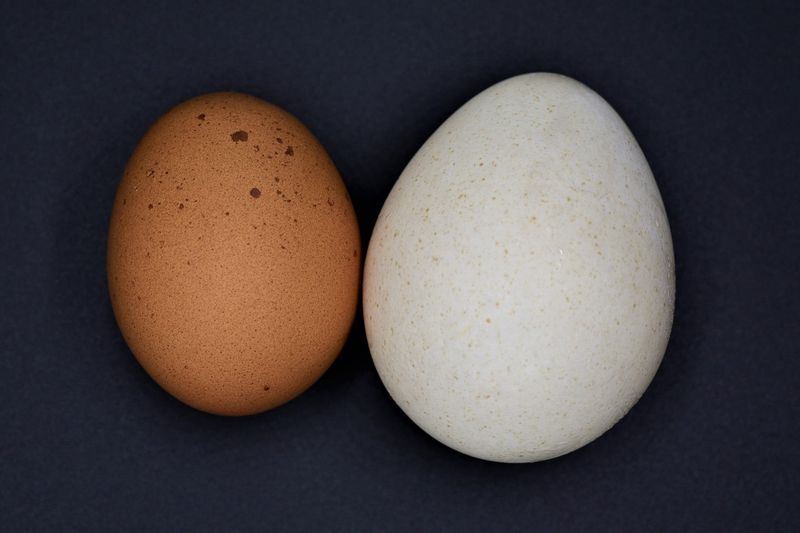6 Reasons Turkey Eggs Aren’t on Your Plate And 9 Surprising Facts That Might Change Your Mind

Turkey eggs are a culinary curiosity often overshadowed by their chicken counterparts. While not commonly found on breakfast tables, these eggs hold a unique place in both the food industry and cultural culinary practices. This blog post will explore the reasons why turkey eggs are not as prevalent in our diets, as well as some unusual and fascinating facts that might just tempt you to give them a try.
1. Turkeys Lay Fewer Eggs

Unlike chickens, which are prolific layers, turkeys produce far fewer eggs annually. With a maximum of about 100 eggs per year, turkeys are simply less productive. This low output makes turkey eggs a rare find in the market.
The limited availability naturally leads to higher costs, which makes them a less attractive option for both consumers and producers looking for cost-effective egg options.
The rarity of turkey eggs contributes to their allure but also explains their absence from most grocery aisles. Their scarcity is a significant factor in why we don’t see them as often on our plates.
2. They’re Expensive to Raise

Raising turkeys is an expensive endeavor. They consume more food, require additional space, and take longer to reach maturity compared to chickens. These factors collectively contribute to the higher cost of turkey eggs.
The economic implications mean that turkey eggs are priced significantly higher than chicken eggs, often making them a luxury item rather than a staple.
Farmers focusing on cost-effectiveness are more inclined to raise chickens, leading to fewer turkey egg producers. The economics behind raising turkeys is a major reason why their eggs remain scarce in the marketplace.
3. Most Turkeys Are Raised for Meat

The poultry industry prioritizes meat production over egg-laying when it comes to turkeys. Most turkeys are bred and raised explicitly for their meat, as the demand for turkey meat is significantly higher than that for their eggs.
This focus on meat production means that eggs are often a byproduct rather than a main product of turkey farming. As such, turkey eggs don’t receive the attention they deserve as a potential food source.
The industry’s focus is a significant reason why turkey eggs haven’t made their way to the mainstream breakfast table.
4. They’re Harder to Find

Turkey eggs are not mass-produced, making them a rare sight in conventional grocery stores. To find these eggs, one often has to visit specialty markets or local farms.
Their rarity makes them a novelty item, intriguing to those who seek unique culinary experiences. However, for the average consumer, the effort required to locate turkey eggs is often prohibitive.
This difficulty in finding turkey eggs is another reason why they haven’t become a common part of our diets. Availability plays a big role in consumer choice, and turkey eggs simply aren’t widely available.
5. They’re Bigger and Break Easier

Turkey eggs are larger with thicker, speckled shells, but paradoxically, they break more easily than chicken eggs. This fragility makes them challenging to transport and store.
The larger size is appealing for culinary uses, but the ease with which they crack means they require more careful handling.
Their fragility adds an extra layer of complexity for distributors and sellers, further limiting their availability in stores. This fragility is a key factor in why turkey eggs aren’t a staple in many kitchens.
6. People Just Aren’t Used to Them

The familiar sight of chicken eggs on our breakfast tables is a cultural habit that turkey eggs have not been able to break into. People tend to stick with what they know and trust.
Turkey eggs have been overshadowed by the more universally accepted chicken eggs, simply because the latter got a head start in the culinary world.
This lack of familiarity has contributed to turkey eggs being absent from many recipes and menus. Without cultural momentum, turkey eggs remain an intriguing but unconventional choice.
7. They Taste Richer Than Chicken Eggs

Turkey eggs offer a culinary experience that is distinct from their chicken counterparts. With a creamier texture and slightly richer flavor, they are often considered a gourmet option for egg enthusiasts.
The taste difference can make turkey eggs a more indulgent choice for those seeking to elevate their meals beyond the ordinary.
Their rich flavor profile can transform a simple dish into something extraordinary. For those willing to experiment, turkey eggs provide a delightful alternative to the standard egg options.
8. They’re Great for Baking

The size and yolk-to-white ratio of turkey eggs make them ideal for baking. Their larger yolks help create moist, fluffy baked goods that stand out in texture and taste.
Bakers who have experimented with turkey eggs often find that the results are superior to those achieved with chicken eggs.
Whether it’s a cake, pastry, or bread, turkey eggs can add a unique dimension to your baked creations. Their effectiveness in baking is one of their standout qualities, making them a prized ingredient for those in the know.
9. They Have More Nutrients per Egg

Thanks to their larger size, turkey eggs boast more protein, iron, and vitamins per egg compared to chicken eggs. This nutritional boost can be a compelling reason to choose turkey eggs for those focused on a nutrient-rich diet.
The added nutritional benefits make them an enticing option for health-conscious consumers seeking to maximize their dietary intake.
While they may not be as common, the health advantages of turkey eggs provide a strong incentive for those looking to diversify their nutrient sources.
10. One Egg = Two Chicken Eggs

With their larger size, a single turkey egg can be equivalent to two chicken eggs in many recipes. This means fewer eggs to crack, simplifying meal preparation for dishes requiring multiple eggs.
For omelet lovers and breakfast enthusiasts, this can be a time-saving aspect worth considering.
The efficiency of using fewer eggs without compromising on volume is one of the practical benefits turkey eggs offer. This aspect can appeal to those looking to streamline their cooking processes.
11. The Yolks Are Big and Bold

The yolks of turkey eggs are notable for their size and vibrant golden color. This bold appearance makes them particularly suited for dishes that emphasize yolk quality, such as custards or sauces.
The richness of the yolk adds a depth of flavor that can elevate any recipe, turning an ordinary dish into an extraordinary one.
For chefs and home cooks alike, the distinctive yolks are a compelling feature of turkey eggs, offering both aesthetic appeal and a richer taste profile in culinary applications.
12. They’re a Farmer’s Market Rarity

Turkey eggs are often found at farmer’s markets, where they are considered a unique and seasonal treat. Their limited availability adds to their charm, making them a special find for market-goers.
Shoppers who encounter turkey eggs at these markets often view them as a must-try item, eager to experience something out of the ordinary.
For those who enjoy discovering rare and seasonal foods, turkey eggs provide an exciting opportunity to expand their culinary horizons.
13. Turkeys Are Picky Layers

Turkeys are known to be selective when it comes to laying eggs. They require specific conditions, such as a quiet and undisturbed environment, to feel comfortable enough to lay.
This pickiness means that turkey eggs are not as consistently available as chicken eggs, adding to their rarity and appeal.
For those who do manage to acquire turkey eggs, the knowledge that they come from such selective layers can make them feel like a special treat. This selectivity contributes to their unique status among poultry eggs.
14. Some Cultures Do Eat Them

In various parts of the world, particularly in Central America and rural Europe, turkey eggs are enjoyed as a culinary delight. These cultures have incorporated turkey eggs into their traditional dishes, appreciating their unique taste and texture.
This cultural acceptance highlights the versatility and appeal of turkey eggs when given the opportunity.
For those looking to explore international cuisines, turkey eggs offer a taste of cultural diversity, showcasing how different communities utilize this uncommon ingredient.
15. You Can Raise Turkeys for Eggs

Backyard turkey owners often raise these birds specifically for their eggs, appreciating the unique taste and qualities they bring. Although turkey eggs are not laid as frequently, they are a reliable and tasty addition to a homestead.
Raising turkeys for eggs can be a rewarding endeavor for those interested in sustainable and self-sufficient living.
For hobbyists and small-scale farmers, turkey eggs provide an opportunity to explore alternative egg production methods, expanding their agricultural experiences and culinary repertoire.
